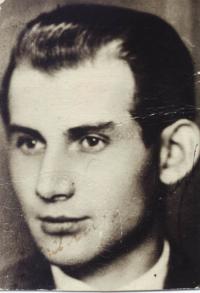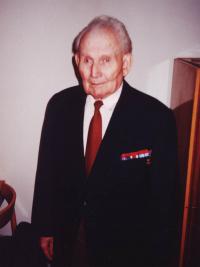Private Jaroslav Flajšingr
* 1916 †︎ 2012
-
“When I got to Poprad, I was wounded – a grenade splinter blew off a few of my fingers. Apart from that I also had huge blisters on my feet, filled with blood. The healing method there was very simple: they cut it open and put some iodine on it - that was it! My feet hurt terribly because I had completely inconvenient boots. My original boots burned off in a campfire and I had to go looking for new boots somewhere. Finally I took a pair of boots from some corpse but they were causing these big blisters of mine. When I came to a real doctor he checked me and said: “It’s gonna be alright. What else do you have?” So I told him this and he said damn, they only cut it open and this… and I said yes. So he talked to me and eventually asked where I’m from. He said I’m neither a Slovak, nor a Ukrainian so he was wondering where I’m from. So I told him I’m from Moravia from Židlochovice, nearby Brno. He said: “Do you know where Tvarožná is?” I said: “somewhere nearby Brno”. “So I’m from Tvarožná, doctor, docent Josef Liškutín.” He then asked if I could drive a car because he needed a driver. I told him I can’t but he still wanted me as his driver. He said I'd be a good driver because I'm young and because I seemed to be skillful so he thought it would be a pity if I died there. He called the technical division – that’s where I heard Czech to be spoken (but they were mostly Jews) – and told them he needed me to become his driver.”
-
“So let me go back to one more thing. There were these public holidays in July, Cyril and Metod, and he said: “Jaroušku, we should go home to see our parents and relatives, it’s been so long already since the end of war (it was already about two or three since the war had ended). Do you have gasoline?” I said: “Yes, I do.” I had petrol from the guys who sometimes wanted to go to the festivities but didn’t want to go on a truck, so I took them there with a car – so I simply had petrol. I said that with a personal car it’s not the right thing, that we needed something faster and he said we should go and look around, that we’ll certainly find something. So we found a jeep, you could simply turn it on with a screw driver – it was warm. So we hurried home. First of all we visited his brother in Brno. He lived in the Masaryk quarters just down this road. He was a professor at the Faculty of natural sciences in Brno. When we arrived at his place there of course was a lot of crying happy tears and all that stuff, I don’t even want to talk about it that much. Then we continued to Tvarožná to see his mother. It wasn’t quite a villa, it rather was a house with an attic. She probably was a widow. I didn’t ask but she must have been a widow, living all by herself in this house. And again, as we came, there was crying and the happiness of seeing each other after such a long time. We all cried. After being there for about three hours he told me to take the jeep and to go home for two days and then to come back so we could return to Prague. So I went home and yes, what am I supposed to tell you, the same story again, happy reunion with my parents, crying happy tears etc. The news that I’m alive and home spread very quickly in this village of Křepice and immediately festivities were held for me, a band was playing and the women were baking cakes for me. All the inhabitants of the village were celebrating till the morning.”
-
“We worked there and we were also going out to pubs. And in these pubs we were meeting all kinds of people. And among others there also were people who at that time already had connections to captain Jegorov and to Šánský. That was the group on the Prašivá Mountain – that’s how they called the place in the Lower Tatra and this group was preparing the uprising there. Well, we knew about these plans but as young lads who had never before held a gun in their hands, we were incapable of conceiving what it’s going to look like. So we took it with a sportsman-like attitude, because we weren’t sure if it’s gonna happen or not. This Jegerov entertained contacts with some of our boys – with Láďa Nerudový in particular – and his task was to prepare us for the day the uprising will take place. He asked whether if need be we would come to Prašivá Mountain to support the uprising and we said: “Yes sure, why not.” Well some actually didn’t say this because they already had families and so they were afraid. So there wasn’t happening much until the year 1944 when we suddenly learned that the situation is already serious and that this lieutenant colonel Hulián allegedly has secured the support of several garrisons that will join the uprising. That’s when they told us that the code-word will be announced and will be: “Start the evacuation!” in Slovak.”
-
“I held out there till September the 1st when conscriptions started. The worst thing about it, however, is that my certificate says “end of war on the 5th of May.” I disagreed with it but at first I didn’t even know whether I’ll ever need it. By the time I needed it I told them that we were still in Terezín on the 10th. So I sent a letter to the Ministry of national defense in which I described these misrepresentations about my case and that it’s not true, that I was there till September and so on so forth. The Ministry replied among other things: “Military service in the 1st Czechoslovak army corps is effectively performed only till the 5th of May 1945. You served after the 5th of May 1945 as well, until the 1st of September 1945. But due to some paragraphs it can not be changed and has to remain as it is there. Well, I told myself I don’t wanna be rude as it clearly sais here I served till the 1st of September 1945, but because of these it’s just not possible. Well, if it’s not possible, then it’s not possible. So I gave it all up and that was it.”
-
“We were the last to retreat from Bánská Bystrice, the very last. The folks were leaving, the army was leaving - everybody was already gone. Everyone was going in the direction of Staré Hory, Donovaly, Motyčky. That was the final destination where the lieutenant-colonel Golian and general Viest were waiting for us. Before we left Bánská Bystrice we blew up the post office and all of the communications. Then we left the town as the last ones. In this Staré Hory there was a train and everyone could take – except for the weapon which everyone had to have with him – everything he wanted, ranging from cigarettes and liqueurs to clothes. Švejna told us: “boys take as much canvas and warm clothing as you possibly can because it’s gonna be really cold out there.” It was autumn by then already when the Soviet army was in the Carpathian Mountains. It was October the 6th. I remember this October the 6th because formerly it was celebrated as artillery day. So we came to this Starý Hory and I took what I needed – some liqueur of course, but not too much. Most importantly I took a canvas and warm clothing and shoes. Well, unfortunately, this backpack was rather small and you wouldn’t put too much stuff inside. Some of course stuffed their backpacks with liqueur and ended up badly later on.”
-
Full recordings
-
ČR, 20.05.2003
(audio)
duration: 51:00
Full recordings are available only for logged users.
I don’t even want to remember how many times I prayed and cried. I don’t want to recall this because I didn’t know at that time how I would end up.
Jaroslav Flajšingr was born on 4 November 1918 in Mikulčice. He was trained in the machine works Martinásek in Židlochovice. He started to work in the Brno armaments works as a technician in the development workshop and later went to work to the arms factory in Vsetín. In 1943 he was assigned to the machine works in Piesok in Slovakia where he took part in the national uprising and joined the 1st Czechoslovak army corps. After the war, he worked till 1960 in the ONV in Brno Hustopeče. He shortly worked in Břeclav and later became a technical-development agent in Plynokov. Before his retirement in 1980 he was commissioned with the construction and management of a factory that was filling gas cylinders with propane-butanal. Died in 2012.

